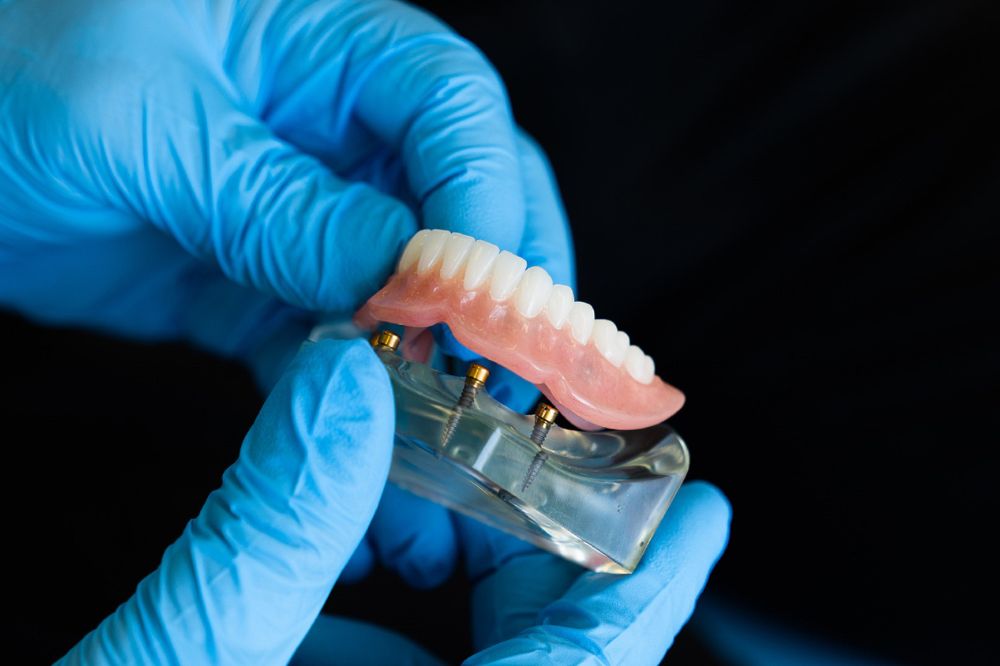How Ageing Affects Oral Structures
Even with excellent oral hygiene, the body changes as part of the natural ageing process. These changes can directly impact denture comfort and function.
-
Bone resorption: After tooth loss, the jawbone gradually shrinks (a process known as bone resorption). According to the National Institute of Dental and Craniofacial Research (NIDCR), bone loss can lead to changes in the shape of your mouth, making dentures loose over time.
-
Gum recession: Gums may shrink or become thinner with age, affecting how dentures rest on the tissue.
-
Changes in bite: As the jawbone and muscles adapt, your bite may shift, impacting how dentures align.
-
Oral dryness: Many older adults experience dry mouth (xerostomia) due to medication or medical conditions. This can reduce the natural suction that helps keep dentures in place.
These changes are gradual but significant, which is why denture wearers must stay proactive with ongoing care.
The Importance of Regular Check-Ups
At Dentist Acton, we encourage patients with dentures to attend routine appointments. Even if you don’t feel discomfort, subtle changes in your gums or jaw can lead to problems if not addressed early.
Regular dental visits allow us to:
-
Assess the fit and stability of your dentures
-
Check for sore spots, irritation, or infections
-
Monitor bone and gum health
-
Recommend relining, rebasing, or replacement if needed
The NHS advises that dentures typically last between five and ten years, but adjustments are often necessary within that time frame to keep them comfortable.
Signs Your Dentures Need Adjustments
How do you know if your dentures no longer fit properly? Common signs include:
-
Dentures slipping when speaking or eating
-
Increased use of adhesive to keep them in place
-
Sore spots or irritation on your gums
-
Difficulty chewing certain foods
-
Changes in facial appearance, such as sagging cheeks or lips
If you notice any of these symptoms, don’t wait — book an appointment with your dentist. Small adjustments can restore comfort and prevent further issues.
Relining, Rebasing, and Replacing Dentures
Over time, dentures may need more than just cleaning and daily care. Here are the common options for extending their life:
-
Relining: Adding new material to the base of the denture to improve fit.
-
Rebasing: Replacing the entire base while keeping the existing teeth.
-
Replacement: Creating a brand-new set of dentures for optimal function and aesthetics.
Your dentist will recommend the best option depending on your oral health, age, and lifestyle.
Tips for Maintaining a Comfortable Fit
In addition to professional care, there are daily habits that help keep dentures comfortable as you age:
-
Clean daily: Brush dentures with a soft-bristled brush and soak them overnight in a denture solution. Avoid using hot water, which can warp them.
-
Care for your gums: Gently brush your gums and tongue to stimulate circulation and prevent irritation.
-
Stay hydrated: Drinking plenty of water helps combat dry mouth and improves denture stability.
-
Eat a balanced diet: Foods rich in calcium and vitamin D support bone health, which is essential for denture comfort.
-
Handle dentures carefully: Clean them over a folded towel or bowl of water to avoid breakage if dropped.
For more guidance, our team at Dentist Acton provides personalised advice on cleaning routines, storage, and long-term care.
Dentures and Quality of Life
Well-fitting dentures do more than replace missing teeth — they improve your quality of life. Comfortable dentures can:
-
Restore your ability to chew and enjoy a variety of foods
-
Support clearer speech
-
Maintain facial structure and prevent sagging
-
Boost confidence with a natural-looking smile
Research shows that denture wearers with properly maintained prosthetics report higher satisfaction and better overall oral health compared to those who neglect routine adjustments.
Why Choose Dentist Acton for Denture Care?
At Dentist Acton, we combine modern technology with decades of experience to provide custom dentures and ongoing care. Our clinic in West London serves patients from Acton, Ealing, Chiswick, and Shepherd’s Bush, offering:
-
Tailored denture fittings for maximum comfort
-
Relining, rebasing, and replacement services
-
Preventive check-ups to monitor changes in oral structures
-
Friendly, patient-focused care in a modern practice
We understand the impact ageing can have on oral health, and our goal is to keep your dentures comfortable and your smile healthy for years to come.
Conclusion
Ageing is a natural process, but it doesn’t have to mean discomfort with your dentures. By understanding how oral structures change over time, staying consistent with professional check-ups, and following good daily care practices, you can enjoy dentures that remain comfortable, functional, and natural-looking.
If you live in Acton or West London and want expert denture care, book a consultation with Dentist Acton today. Our team is here to ensure your dentures evolve with you — keeping your smile confident at every stage of life.




